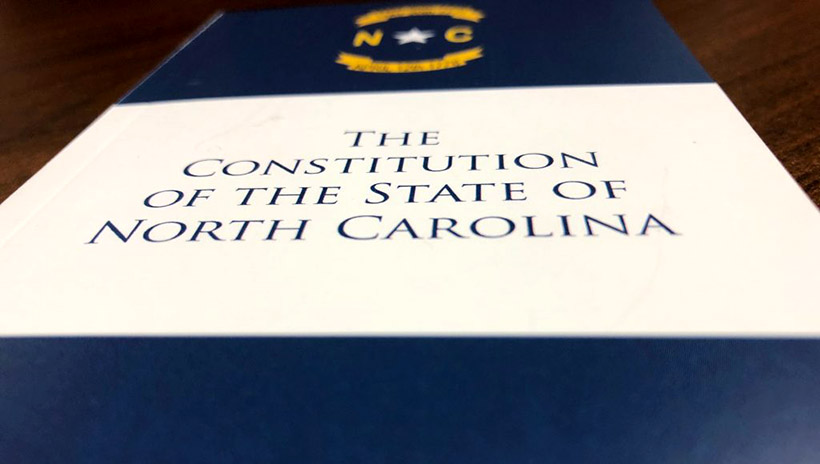Publisher's note: This post appears here courtesy of the Carolina Journal, and written by Julie Havlak.

Homeowners whose property was taken by the government for highway projects may be out of luck if Gov. Roy Cooper signs the transportation bill on his desk.
A provision in
Senate Bill 356 controls the cost of the Map Act - a controversial 1987 law that let the DOT seize private land without immediately paying landowners - with tactics that attorneys say are flagrantly unconstitutional. S.B. 356 passed the House and Senate by overwhelming margins Thursday, Nov. 14.
If the bill becomes law, most homeowners can expect their lawsuits to drag on another five to seven years. It effectively stalls a DOT settling spree. The department had settled nearly 400 cases since 2018, after a series of setbacks in court made further delays
"costly and irresponsible," Transportation Secretary James Trogdon said in a letter to the General Assembly.
The Map Act was repealed earlier this year.
Under S.B. 356, the department won't be able to spend more than $150 million on compensation each year, except for a Turnpike project. And homeowners won't reap compound interest during any delays. Instead, the bill dictates that they will collect only simple interest.
Rep. John Torbett, R-Gaston, said he warned the Senate that the language would be "wide open" to litigation. And, sure enough, multiple attorneys have promised to challenge the constitutionality of the bill.
"It's all unconstitutional. They've tried this before, and I guess they don't learn. You can't treat some owners differently from others," said attorney Matthew Bryant, who represents Map Act clients.
"They violated people's property rights for more than 20 years, got the benefit, and now they have to pay. It's that simple, and there's no amount of legislative gymnastics that will change that."
A Map Act
case is pending before the N.C. Supreme Court, and the hearing will begin in December. The legislation could therefore raise issues with separation of powers, said John Locke Foundation Director of Legal Studies
Jon Guze.
Legislators called the situation "awkward" because they were stuck with a conference report they couldn't amend.
"I'm not so sure that people are so concerned about what happens and how you are treated once the government takes your property," House Minority Leader Darren Jackson, D-Wake, said.
"Now we're making another change for DOT because of an active court case. And I'm just not sure that's the way we should treat folks who are not giving up their property voluntarily."
Senate Majority Leader Harry Brown, R-Onslow, said he worked out the cap with the DOT to help prevent another debacle with overspending and delays.
"As the DOT gets their cash flow issues in line, and a year or two goes by, we can take another look at it," Brown said.
"But this is to help with their cash flow issues at this point."
Brown acknowledged the cap would likely string out settlements for several years.
The DOT has already been chastised for dragging out cases. Hundreds of homeowners have waited decades for any resolution. And in 2018, a Superior Court judge
sanctioned the department for missing a May deadline for Map Act property appraisals.
Lawyers warn that stripping away compound interest weakens the department's incentive to settle cases at all.
"Interest was one factor in [homeowners'] favor to help protect them and ensure that they got full just compensation," said Raleigh attorney David Henson of Henson Fuerst.
"As that interest rate is dropped, it further tips the tables in favor of the government against the individual."
The practicality of capping the settlement amounts each year is also questionable as lawsuits continue, Guze said.
"On the face of it, it's like passing legislation that says we're going to have more days in the year. I just don't see how that would work," Guze said.
The government's ability to dictate interest rates is constitutionally dicey, lawyers involved in Map Act litigation say.
"To begin with, a property owner's right to just compensation is not some grant by grace of the legislature. It is a fundamental right under the N.C. and U.S. constitution," Fayetteville attorney Neil Yarborough said.
This isn't the first time the legislature has tried to suppress the financial impact of the Map Act on its budget. In 2016, the legislature passed a law limiting the interest rate homeowners could receive. The law was shot down by the Superior Court in Forsyth County.
"It was bad enough that the legislature was stabbing property owners in the back in 2016 by trying to drop the interest rate," Henson said.
"This is another attempt to drop that responsibility to a lower level than before."
The cost of the Map Act could eventually exceed $1 billion, according to the DOT's estimates.
"This is just standard constitutional law 101," Yarborough said.
"But, unfortunately, if the General Assembly had been thinking about this, they never would have passed that statute to start with."
























